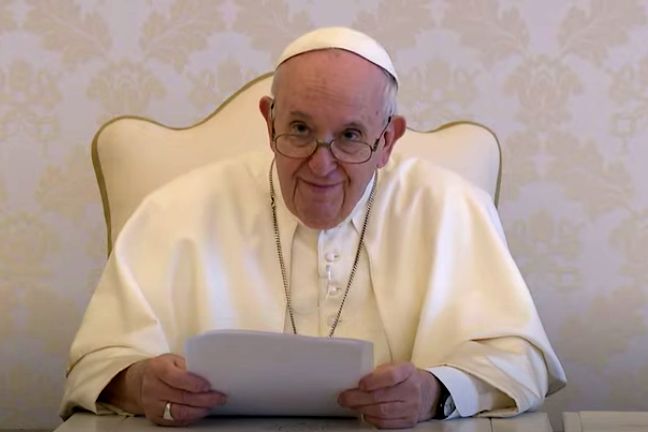
Vatican City, Aug 30, 2023 / 08:47 am (CNA).
Pope Francis said Wednesday he will release a follow-up environmental document to the 2015 encyclical Laudato Si’ on Oct. 4, the feast of St. Francis of Assisi.
Speaking at the end of his general audience Aug. 30, the pope said he plans “to publish an exhortation, a second Laudato Sì’,” at the end of a Vatican-supported ecumenical initiative that will run Sept. 1–Oct. 4.
The Season of Creation will begin, Pope Francis said, on Sept. 1, which is the World Day of Prayer for the Care of Creation. This year’s theme is “Let Justice and Peace Flow.”
“Let us join our Christian brothers and sisters in the commitment to care for creation as a sacred gift from the Creator,” Francis urged at his public audience.
“It is necessary to stand with the victims of environmental and climate injustice, striving to end the senseless war on our common home, which is a terrible world war,” he added. “I urge all of you to work and pray for it to abound with life once again.”
Pope Francis announced last week that he is writing a second part to his 2015 environmental encyclical Laudato Si’.
The pope said with this new writing he is updating Laudato Si’ to cover current issues.
The Holy See Press Office director, Matteo Bruni, confirmed to CNA on Aug. 21 that “the pope is working on a letter updating Laudato Si’ with regard to the recent environmental crises.”
Laudato Si’ is the second of three encyclicals published in Pope Francis’ pontificate thus far. It was released in June 2015.
The theme of the encyclical, which means “Praise be to you,” is human ecology, a phrase first used by Pope Benedict XVI. The document addresses issues such as climate change, care for the environment, and the defense of human life and dignity.
Pope Francis said Aug. 30 that the second part to Laudato Si’ would be the kind of papal document known as an “exhortation.”
Francis has so far published five apostolic exhortations during his pontificate, including Evangelii Gaudium and Amoris Laetitia.
The feast of St. Francis of Assisi was also the date in 2020 that Pope Francis chose to release his most recent encyclical, Fratelli Tutti, about fraternity and social friendship.
If you value the news and views Catholic World Report provides, please consider donating to support our efforts. Your contribution will help us continue to make CWR available to all readers worldwide for free, without a subscription. Thank you for your generosity!
Click here for more information on donating to CWR. Click here to sign up for our newsletter.





We read: “The theme of the encyclical, which means ‘Praise be to you,’ is human ecology, a phrase first used by Pope Benedict XVI.”
Editorial license, or amnesia…
Benedict XVI spoke of “integral humanism”, a term that can be traced back at least to Jacques Maritain, meaning something about the whole person rather than, say, the wholeness of our common home.
It was St. John Paul II who introduced the phrase “human ecology,” in Centesimus Annus (CA, 1991), to distinguish it clearly from the, yes, interrelated “natural ecology.” The combined neologism “integral ecology”–likely to be exploited ideologically–was invented in Laudato Si.
Lost in the new mix might be this clarity (from CA nn. 37-39):
“…worrying is THE ECOLOGICAL QUESTION [….] In addition to the irrational destruction of the natural environment, we must also mention the more serious destruction of THE HUMAN ENVIRONMENT [….] Although people are rightly worried—though much less than they should be—about preserving the natural habitats of the various animal species threatened with extinction, because they realize that each of these species makes its particular contribution to the balance of nature in general, too little effort is made to SAFEGUARD THE MORAL CONDITIONS OF AN AUTHENTIC ‘HUMAN ECOLOGY’ [….]
“The first and fundamental structure for ‘human ecology’ is the FAMILY in which man receives his first formative ideas about truth and goodness, and learns what it means to love and to be loved, and thus what it actually means to be a person [….] These policies [e.g., recourse to abortion as] poisoning the lives of millions of defenseless human beings, as if in a form of ‘chemical warfare’ [….] These criticisms are directed not so much against an economic system as against an ethical and cultural system.”